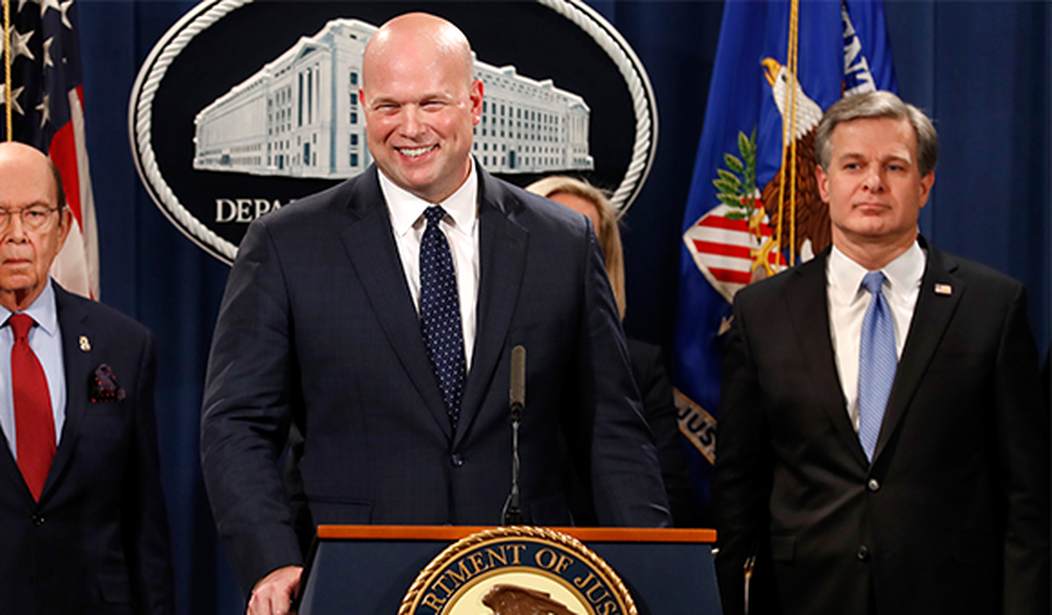Speaking to Former Acting U.S. Attorney General Matthew Whitaker after reading his new book, Above the Law: The Inside Story of How the Justice Department Tried to Subvert President Trump, reinforced the impression I got from reading the book. An outsider who came to Washington, D.C., to serve as Attorney General Jeff Sessions’ chief of staff, he views his experiences through the lens of his Midwestern upbringing and values.
The book clearly and concisely outlines the Justice Department and FBI failures Whitaker observed during his tenure. His views are rooted in the Constitution and a concept of service. His job was to assist in implementing the president’s agenda through the activities of the Justice Department.
In describing some of the failures, Whitaker uses the phrase ‘Deep State’ in his book. Because this can be a loaded phrase, I asked him to define his use of the term. “I would describe it as oftentimes and mostly career officials who disagree with the president’s agenda and direction and work to frustrate that agenda,” he said, either by bureaucratic foot-dragging or by an unwillingness to make the arguments in court or otherwise advance the agenda.”
Two specific areas where he saw this type of behavior exhibited were advancing the president’s immigration and religious liberty priorities. He is clear this is not every career official and says the vast majority of the DOJ’s 110,000 employees quietly do their jobs very effectively.
Whitaker attributes much of the bad behavior he observed to two things. One is a concept he called ‘burrowing in.’ This is the practice of converting political appointees to career DOJ officials. The other is the culture created by former Attorney General Eric Holder and former FBI Director James Comey, which he details in the book.
As chief of staff, he was not involved at all in the Special Counsel investigation due to Attorney General Sessions’ recusal. Whitaker said this created a bifurcated DOJ. Upon being appointed acting attorney general, he attempted to restore normal order and went through an exhaustive six-week process using outside counsel to assess his own potential conflicts. Finding none that required recusal, he restored the normal reporting relationships.
During the time Whitaker served as acting attorney general, the biggest frustration was not being able to discuss what he was frequently briefed on. He knew for weeks that Special Counsel Robert Mueller’s team had concluded their investigation and found no collusion. He also knew their decision not to make charges was not based on the Office of Legal Counsel’s guidance regarding charging a sitting president.
He fully expected the Mueller team to issue their report around the end of 2018 and made a statement to that effect in January of 2019. Of course, the report would not be issued until after Attorney General William Barr was confirmed. Whitaker provides a clear and compelling defense of Barr’s actions leading the DOJ since that time.
One thing Whitaker is looking forward to is the outcome of the Durham investigation. He expresses confidence that if there is sufficient evidence a crime was committed, the appropriate individuals will be charged. If there is not, he at least expects to get insight into the decision making that culminated in the years-long collusion investigation. He points out the key actions taken by people like Acting FBI Director Andrew McCabe that seemed to drive the process but were based on extremely shaky predicates.
He is also curious to hear the testimony of former Deputy Attorney General Rod Rosenstein to the Senate Judiciary Committee. “I’ll be watching along with everyone else,” he explained. “Again, this is the first time he has been able to speak freely about some of these things. I look at his previous appearances, when he was deputy, were oftentimes combative and did not reveal a lot of information. I think this is going to be a real chance for the former deputy attorney general to speak to a lot of the decisions he made.”
Whitaker also gives solutions to the issues he highlights in the book. One overarching idea that he believes could improve many things is having more people rotate in and out of government service at all levels. His own career has been 25% with the DOJ and 75% in the private sector. He believes this allowed him to bring a different perspective to his service. He fears that the very public harassment of members of President Trump’s administration by the media and the political opposition may discourage good people from serving.
One specific area he believes needs to be fixed is the Special Counsel regulation. The idea, in Whitaker’s estimation, is fundamentally flawed and investigations should be done by U.S. attorneys like the Durham and Flynn investigations have been done.
Above the Law is an insightful read and presents what happened during Whitaker’s DOJ tenure through the eyes of a D.C. outsider. It puts the story in the context of the culture of Washington, D.C., when providing the relevant facts. Well written and researched and easy to follow, it is a must-read if you want a unique perspective on the Department of Justice and key events in the Russia collusion investigation timeline.










Join the conversation as a VIP Member